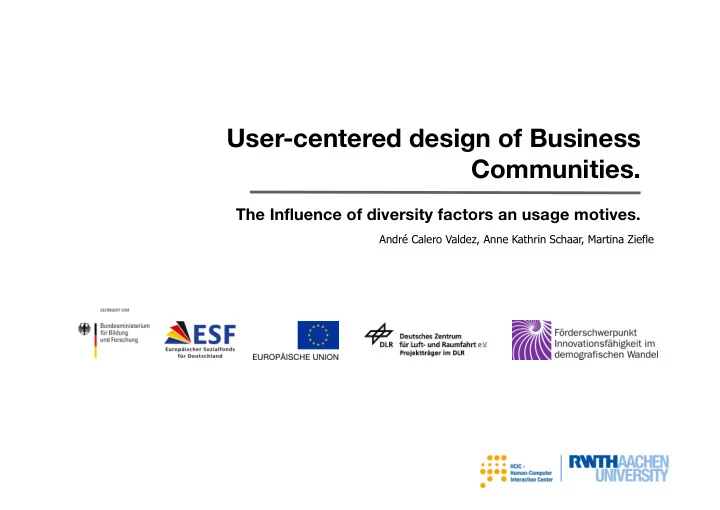

User-centered design of Business Communities. The Influence of diversity factors an usage motives. André Calero Valdez, Anne Kathrin Schaar, Martina Ziefle
Agenda § Background information & motivation – Changes in the business world – Social network services – a potential solution? – User-Centered Community Design § Study: “User-centered design of business communities. – Research questions – Sample – Central findings § Discussion, limitations, future work
The working world in an upheaval Change from production to Arising challenges innovation Loss of knowledge is to compensate - – Knowledge = central resource of Solutions for a sustainable knowledge todays economies - storage must be installed New working time models Need for flexible structures for – Parental leave, - communication and knowledge – Stay abroad exchange – Home office Demographic change – Retirement of baby-boomer Lack of qualified new hires - generation (shrinking workforce)
Social networking sites (SNS) – an applicable solution? Practical applicability in Theoretical benefits of SNS the working context: Support communication - Support collaboration - Is it feasible? Map social structures - Provide knowledge storage - Þ Empirical evaluation Proven successful in private - scenarios ? http://www.gsn-norderney.de/wp-content/uploads/soziale-netzwerke.jpg
Study “ User-centered design of business communities. The influence of diversity factors on motives to use communities in professional settings. ”
The approach of user-centered community design Influence of diversity aspects on usage motivation, incentives and usability
The approach of user-centered community design Influence of diversity aspects on usage motivation, incentives and usability
Research Question Do certain user diversity factors (age, gender, social media expertise, achievement motivation, perceived locus of control) influence the motives to use social media professionally? RQ5: Does personality (FFM) influence the willingness to disclose data in different contexts? RQ6: Is there an impact of moderating variables on the willingness
Research design § Online Questionnaire – Two parts: 1. Independent variables • Age, gender, perceived locus of control over technology (ploc), achievement motivation (AMI, short version), social media expertise (SME), 2. Evaluation of dependent variables on a scenario basis • 11 motives to use social media professionally (3 items each) fun, control, financial rewards, social interaction, acknowledgement, ease of use, autonomy, information, self- portrayal, feedback, institutional fit
Sample § N=72 § Age range: 21 to 63 years (M = 40.31, SD = 11.65) § Gender almost balanced ( � = 36 ; � = 38) § High educational level (50% with university degree) § Job tenure: M = 18.63 years (SD = 12.42) – Current employment: 1 to 40 years (M = 8.86, SD = 8.66) § High self-reported locus of control § SNS usage more likely for private than business § Achievement motivation above average
Results: Motives for professional social media use Evalua*on%of%usage%mo*ves%in%the%context%of%business% communi*es% informa>on" autonomy" ins>tu>onal"fit" contact" usage%mo*ves% social"interac>on" feedback" fun" control" financial"rewards" self6portrayal" acknowledgements" 1" 2" 3" 4" 5" 6" total%rejec*on %%%%%%%%%%%%%%%%%%%%%%%% %%total%confirma*on% Comparision of mean evaluation of motives to use social media professionally on a six- point Likert-scale (1 = total confirmation, 6 = total rejection)
Results: Correlations between diversity factors and motives Level of significance: * p<.05, ** p<0.01
Discussion Classical diversity factors (age & gender) show a low (if any) § correlation with usage motives Information & autonomy are central usage motives § Achievement motivation is associated with many usage motives § – People with a high score in AMI are generally more inclined to motivational aspects even in the context business related affairs Expertise and positive experience leads to a higher evaluation of § usage motives A higher level of expertise might lead to a stronger perceived § need for the opportunities of social media
Lessons learned and future research Main insight Social media still needs new research models for a prediction of § acceptance For a successful integration of social media into business internal § context more research is needed to uncover the ambivalent character of social media Future research Investigation of other diversity factors and different branches of § industry Validation of identified patterns §
Thank you for your attention! Contact RWTH Aachen University, Human-Computer Interaction Center Campus-Boulevard 57 52074 Aachen, Germany Dipl.-Inform. André Calero Valdez Phone: +49 (0) 241/ 80 49239 E-Mail: calero-valdez@comm.rwth-aachen.de
Recommend
More recommend